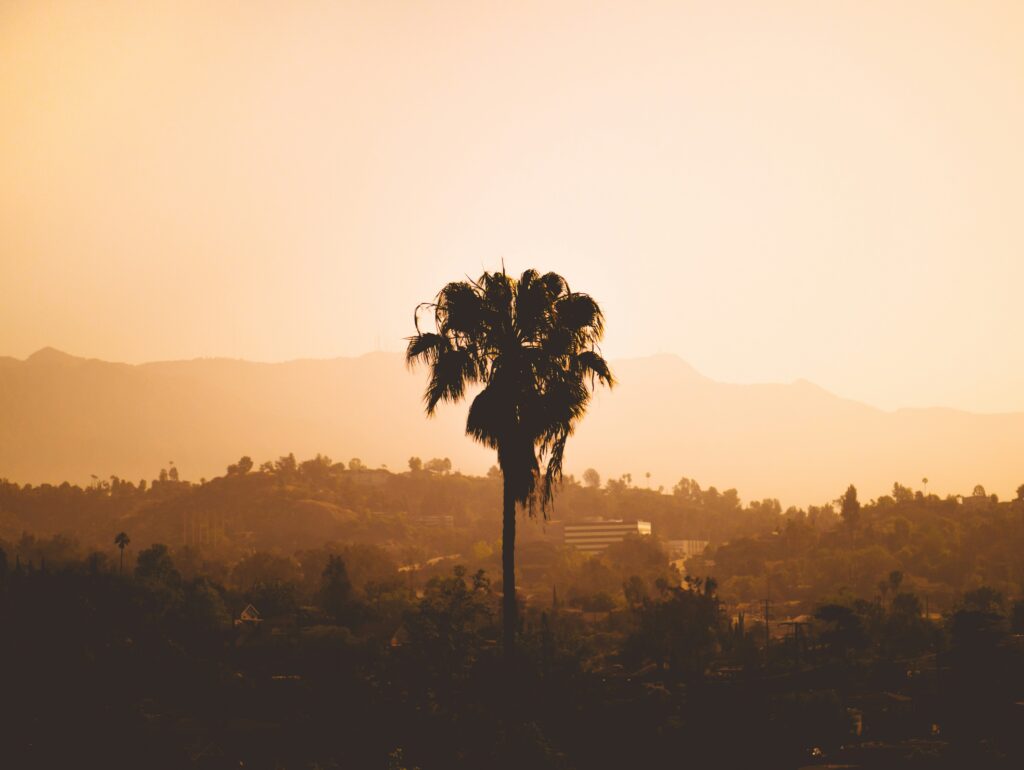Stonecoast Review
The Literary Journal of the Stonecoast MFA
The Tree Trimmer

By Tammy Delatorre
He died in a tree at the end of our street. I didn’t know his name, but I learned of his death on my evening walk, when the air still carried the scent of grass clippings and overheated lawnmowers. One of my neighbors accustomed to seeing me on my usual loop ran out to catch me before I reached the intersection, where a police car blocked traffic.
“Hey, you might not have heard; a guy died next door. A tree trimmer, up on that tree.”
My gaze followed his finger up the trunk to the feathery leaves that seemed tall enough to catch the clouds.
“Did he fall?” I asked.
He shrugged. “I was around the corner when it happened—there was a loud crack, then the man started moaning.”
Skydusters. That’s what people call the tall Mexican fan palms in Los Angeles. I look up at the six giants at the end of our street. I don’t understand why they grow so high. They’re not competing for sunlight among the other trees. Maybe they enjoy towering above our world.
The lower fronds die, but instead of falling to the ground, most remain hanging from the tree. Gradually, the dead leaves accumulate and form a skirt like a hula dancer might wear. But the fronds can unexpectedly come down, landing on someone’s head or denting the hood of a car. Many of these trees grow too tall to be trimmed with a ladder. It’s the specialized tree trimmer, who will scale the trunk, crawl under the skirt, and slowly cut away at the leaves until the cover is gone.
They call trimming a palm “skinning.” They call the cut marks on the trunk “scars.”
“Here.” My neighbor held out his cell phone. The photo was mostly a cutout of blue sky, but I made out the back of a man’s head and his torso in the bottom right corner. My hand flew to my heart. If I had to guess, my neighbor had not wanted to be seen documenting the tragedy, so he must have taken the shot discreetly, resulting in the odd angle. What was clear was the man was hanging upside down, and from the limpness of his limbs, he seemed lifeless.
I left my neighbor and continued on my walk, passing the home with the homicidal tree. The homeowners were out in the street, scurrying to clear fronds from the road. They stacked them in a pile in their front yard. I came across a frond and attempted to lift it. At first glance, it looked light—like a dried-out piece of wood—but my wrist bent awkwardly. I put my back under it, like hefting a sleeping man’s leg. The man who owned the palm rushed forward to take it from me, his eyes avoiding mine. The woman, too, turned away, not wanting to engage in conversation. I stepped over and around the remaining limbs, leaving the couple to their cleanup.
In the Torrance neighborhood where my husband and I live, a part of Los Angeles County, many homeowners hire laborers to do their yard work. I often watch the trucks pull up in front of homes. Lawn mowers and leaf blowers are unloaded, and soon the noise begins. The blowers push leaves and dust into the street. I would not mind paying for landscaping, but my husband insists on doing it himself, which means our yard has slowly devolved into a patchwork of crab grass and weeds. An entire economy is sustained from yard work, a whole stratum of people buoyed by the finances of homeowners, like us, who don’t know how to keep a lawn.
I should help my husband in our yard. I’m Filipina. My ancestors came to the U.S. via the Hawaiian Islands to work on the sugar and pineapple plantations. I did my share of farming and gardening as I was growing up. My family never hired a guy—not to pull our weeds or fix things around our house. My father and brother always did the work themselves.
My father might have been a good tree trimmer. I’d seen him quickly scale a mountain apple tree and toss down the delicate fruit for us to eat.
In the weeks that followed the tree trimmer’s death, my neighbors moved on. They left for work and returned home; they no longer spoke of the death on our street. They talked about the weather and traffic and spring break.
But I couldn’t shake the image of the man hanging from the tree. His world, upside down: the dry hills and black pavement became the wide expanse above his head, and the blue sky, the floor of heaven upon which he might fall.
Maybe in his last moments, he thought of his family—his wife, how he didn’t want to wake her that morning, so he did not say goodbye. He might have also recalled his children’s laughter the night before, coming from other rooms in the house, or maybe he thought of the man below, the one who exclaimed as he started up the trunk, “I don’t know how you can do it.” Many other men had made similar remarks, awed at the height and how the top of the tree swayed in the slightest wind.
I don’t know much about tree trimming, although I come from a long line of landscape artists in Hawai’i. My father trimmed the mock-orange hedges in our blue-collar subdivision. Those hedges helped to block people’s view of our rundown house.
All his life my father worked at the nearby country club, so he was good at sculpting nature into a controlled and manicured beauty that tourists enjoyed. On the weekends, he did odd jobs for extra money. Once, he helped a wealthy man design a short fairway and putting green in his backyard. As a family, we worked on the coffee and macadamia nut farms together. But when I bellied up to the border of the neatly lined trees, I could peer over a stone wall to a tropical forest that found its own order; ‘Ohi’a lehua and Acacia koa dominated the canopy, shrubs huddled in the middle layer, and hapu’u fern scattered across the floor.
My own brother learned to farm and landscape from our father. When he was in his twenties, he began working on a sandalwood farm where they distilled fragrant oil from woodchips culled from the heart between their barks. Within ten years, my brother had worked his way up to foreman and was invited to Washington to teach students about sustainable sandalwood farming. But he never made it to that classroom. He hurt his back and got hooked on painkillers, then meth. Now, he’s living as a homeless man in the bushes of the Big Island.
On my next walk, I stopped at the palm. A small memorial had formed at its base with flowers, candles, and notes. I looked up at the tree and imagined the tree trimmer cutting a frond that caused a domino effect, the entire skirt collapsing and sliding down, pinning him beneath.
Maybe he coughed from the dust raining down from the dried leaves. The backs of his gloved hands might have touched the rough, scarred bark, but at that awkward angle, he couldn’t grab hold and pull himself up, especially with the weight of the skirt on his torso.
As he wheezed beneath the burden on his chest, maybe images of his tree-trimming brethren flashed before him. Over the years, he might have heard how others in his profession had gone. Not far from here in Palos Verdes, a trimmer inadvertently touched a live wire. The resulting power outage cut electricity to thousands of homes. Another fell into a woodchipper, pronounced dead by the time the authorities arrived.
Standing at the foot of the palm, I can’t imagine the tree trimmer anticipated such a fate. The notes around the trunk, mixed with flowers, expressed love for their “Tio Beto.” Maybe this man, like my own father and brother, pushed away any thought of danger, knowing his family relied on his earnings.
In the weeks that followed, I spent time searching the Internet for a news report on the tree trimmer’s death. I wanted assurance that this man’s life mattered, that someone cared to document his passing and recognize the dignity of his work.
I found a video. A cameraman must have been present and posted footage online—not of the tree trimmer’s body but of the scene on our street. In it, the tree trimmer’s wife arrives. She’s off-screen, but I could hear her— the emotion in her scream is something everyone on the street recognizes. They stop what they’re doing and instinctively turn in her direction, then their eyes drop to the ground. Only something as big and old as the earth could hold that grief.
I imagine the tree trimmer’s spirit still lingering nearby. Perhaps upon hearing his wife’s cries, he yearned to comfort her. I played the video over and over.
It was the firemen who finished the tree trimmer’s job. The man might have wished he’d had their tools and method in the first place. They had two long ladders. Two men worked in unison to lift and cut the fronds away from his body. The leaves came down like huge beige snowflakes.
My father has been dead almost a year to the day. He died from lung cancer. The oncologist said the dust, debris, and fiberglass particles that spun up in the maintenance shop where he worked contributed to his condition. Two men I loved endured dangerous occupations that laid waste to their bodies, but they kept our family fed. I think about the well-manicured landscapes that remain from their labors, so lovely they could take your breath away.
TAMMY DELATORRE grew up on the Big Island of Hawai’i and now lives in Los Angeles. She was a Steinbeck Fellow and received support from Barbara Deming Memorial Fund, Summer Literary Series in Tbilisi, Georgia, and Writing by Writers Mill House Residency. Author Cheryl Strayed selected her essay, “Out of the Swollen Sea,” as a Payton Prize winner. Tammy is a three-time Pushcart Prize nominee and twice recognized for Notable Essays in the Best American Essays. Her writing has appeared in Los Angeles Times, Good Housekeeping, Salon, Vice, The Rumpus, and other venues. She has recently finished and is trying to sell her first memoir.
This story originally appeared in Stonecoast Review Issue 22.
Photo by Jamie Street
